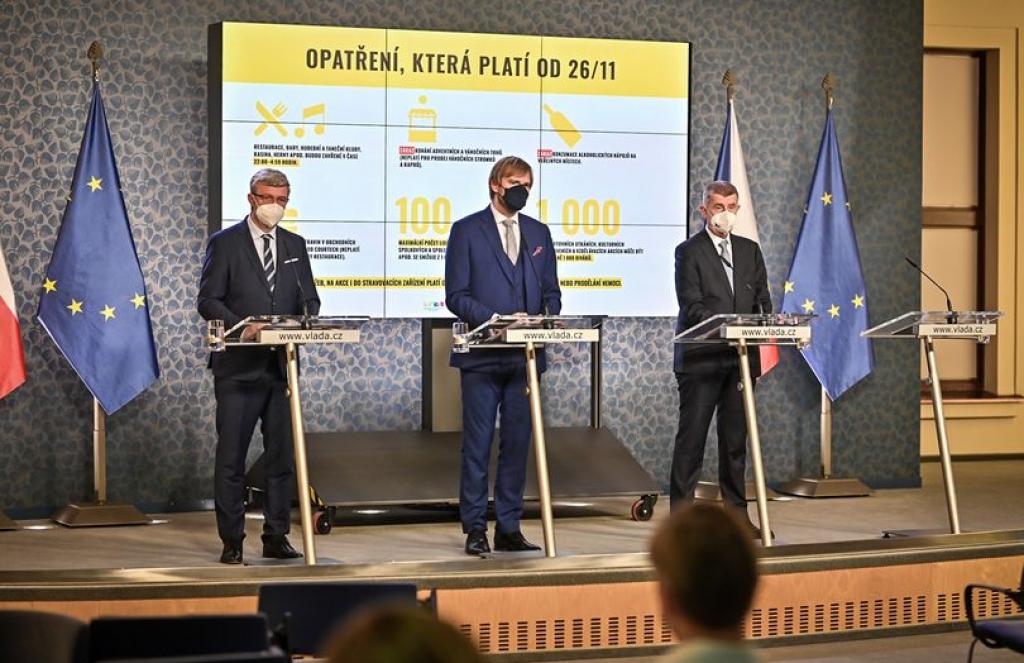Thessaloniki gets ready for its metro launch in November
The underground rapid transit lines have been under construction for almost two decades due to various project delays
 TheMayor.EU logo
TheMayor.EU logo 
The Czech government announced the new measures on 25 November, Source: Czech government on Facebook
The decision comes after the country recorded almost 26,000 COVID cases on Wednesday
In a meeting on 25 November, the Czech government declared a new state of emergency following a spike in COVID cases as the country recorded nearly 26,000 infections on 24 November. The state of emergency came into force at midnight on 26 November and will last for a month, until 25 December.
As of today (Friday 26 November), catering establishments, bars, clubs, casinos, etc., will have to cease operations between 22:00 and 04:59. In addition to this, the government has prohibited the consumption of alcohol in public, except when inside catering establishments.
Discussing the holiday season, the government further revealed that it has banned the operations of Christmas markets. Despite this, citizens will still be able to purchase Christmas trees.
Aside from the above measures, there will also be a limit on mass gatherings in order to reduce the risk of spreading the virus. As such, the maximum number of spectators at sports and cultural events will now be 1,000. Meanwhile, the number of people participating in leisure activities will be reduced from 1,000 to 100.
There will be no limit on the number of people attending funerals.
Currently, 58.9% of the Czech population has been fully vaccinated. This percentage is lower than in Austria (65.8%), where the government recently announced a full lockdown and the mandatory vaccination of citizens from February. To avoid the need to institute similar rules, the government is urging citizens to get vaccinated.
Expanding on this, Prime Minister Andrej Babiš asks people not to believe fake news, noting: “It’s not true. All vaccines we use in the Czech Republic are approved by the European Medicines Agency. Vaccination is the only solution to the COVID-19 pandemic.”

The underground rapid transit lines have been under construction for almost two decades due to various project delays

Now you can get your wine in Talence by paying directly in Bitcoin

That’s because the state has to spend money on updating the railway infrastructure rather than subsidizing the cost of the popular pass

Rethinking renewable energy sources for the urban landscape

The examples, compiled by Beyond Fossil Fuels, can inform and inspire communities and entrepreneurs that still feel trepidation at the prospect of energy transition

Now you can get your wine in Talence by paying directly in Bitcoin

The 10th European Conference on Sustainable Cities and Towns (ESCT) sets the stage for stronger cooperation between the EU, national and local level to fast track Europe's transition to climate neutrality.

At least, that’s the promise made by the mayor of Paris, Anne Hidalgo

The underground rapid transit lines have been under construction for almost two decades due to various project delays

At least, that’s the promise made by the mayor of Paris, Anne Hidalgo

Hostal de Pinós is located in the geographical centre of the autonomous region

Despite its church-y name, the district has long been known as the hangout spot for the artsy crowds

Urban dwellers across the EU are having a say in making their surroundings friendlier to people and the environment.

Forests in the EU can help green the European construction industry and bolster a continent-wide push for architectural improvements.

Apply by 10 November and do your part for the transformation of European public spaces

An interview with the Mayor of a Polish city that seeks to reinvent itself

An interview with the newly elected ICLEI President and Mayor of Malmö

A conversation with the Mayor of Lisbon about the spirit and dimensions of innovation present in the Portuguese capital














